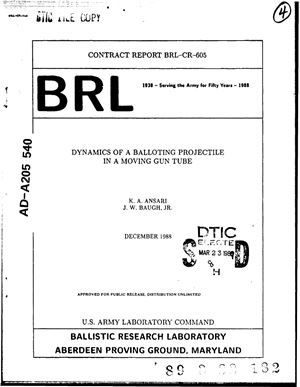Report of Battelle pacific northwest labs. 1988, - 91 p.
In recent years, there have been significant strides made in
modeling gun dynamics. Current capabilities include the use of
flexible gun tube and projectile descriptions. However, modeling
the interface conditions between the tube and projectile is still
an area of very active research. Highly detailed finite element
models, which are currently under development at the BRL and at
other agencies will lead to a much better understanding of the
important parameters involved in the balloting of projectiles.
These models, however, require both substantial computer resources
and time. Thus there is a need for the development of simplified
tube/projectile interface descriptions which both realistically
represent the interface and are easily implemented. The bourrelet/
gun-bore and obturator models incorporated in this study reasonably
satisfy these requirements. A nonlinear dynamic analysis of a
balloting projectile is presented in this report. The mathematical
model used is a six-degree-of-freedom coupled model of the
projectile and gun tube system. The effects of obturator
flexibility and projectile impact with the gun bore at the
bourrelet are included in the analysis, and the nonlinear
differential equations of motion of the system are derived using a
Lagrangian formulation. Gaussian elimination and Newark's
constant-average-acceleration method are employed to obtain a
solution. Finally, numerical results for some specific test cases
are obtained and discussed. Keywords: Computer simulation; Computer
models; Interior ballistics.
Contents:
Introduction.
Literature survey.
System description.
The system kinetic energy.
Bourrelet / gun-bore contact model.
Obturator model.
The system potential energy.
Equations of motion.
Solution technique.
Computer code description.
Numerical results and discussion.
Introduction.
Literature survey.
System description.
The system kinetic energy.
Bourrelet / gun-bore contact model.
Obturator model.
The system potential energy.
Equations of motion.
Solution technique.
Computer code description.
Numerical results and discussion.

